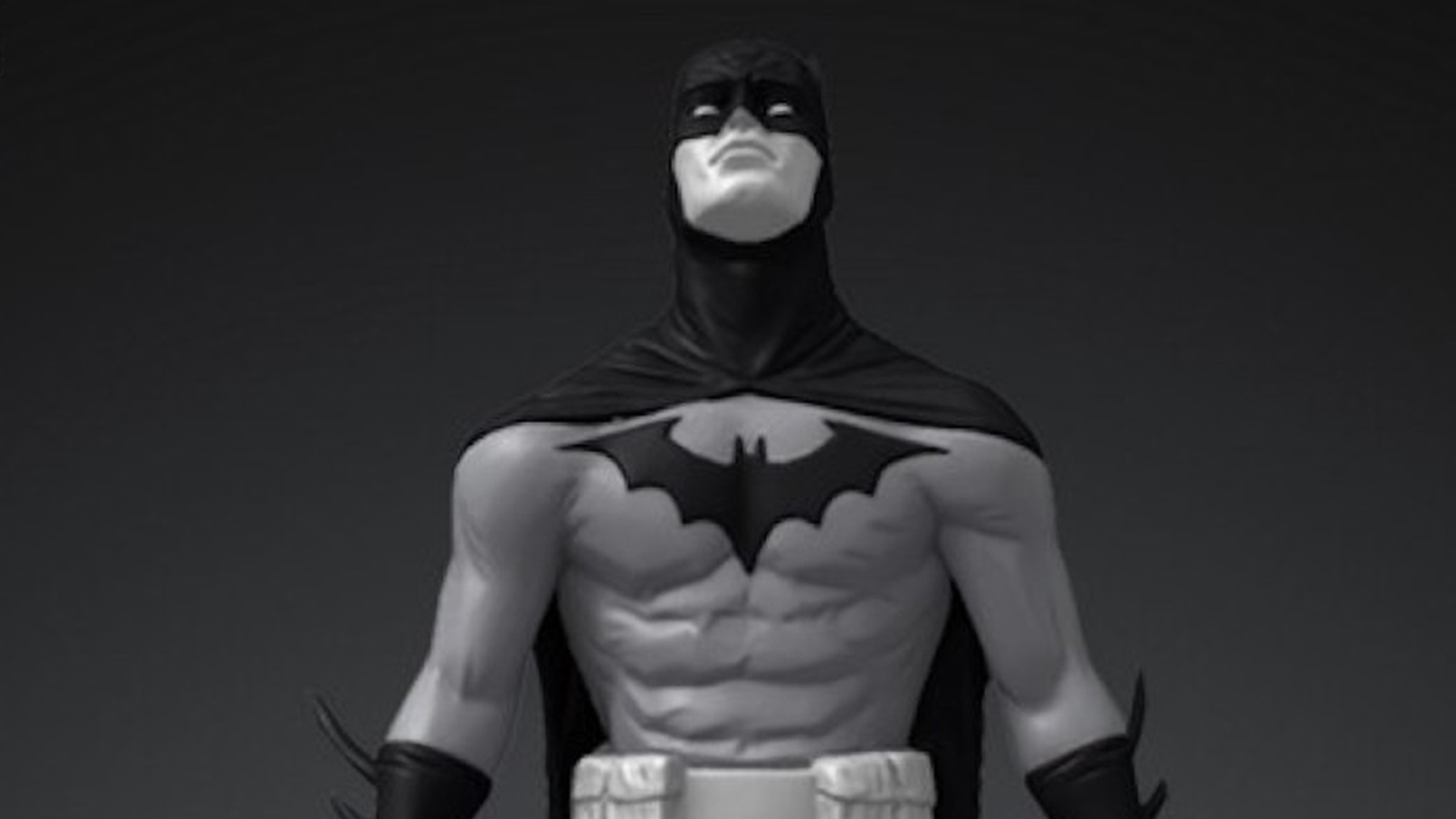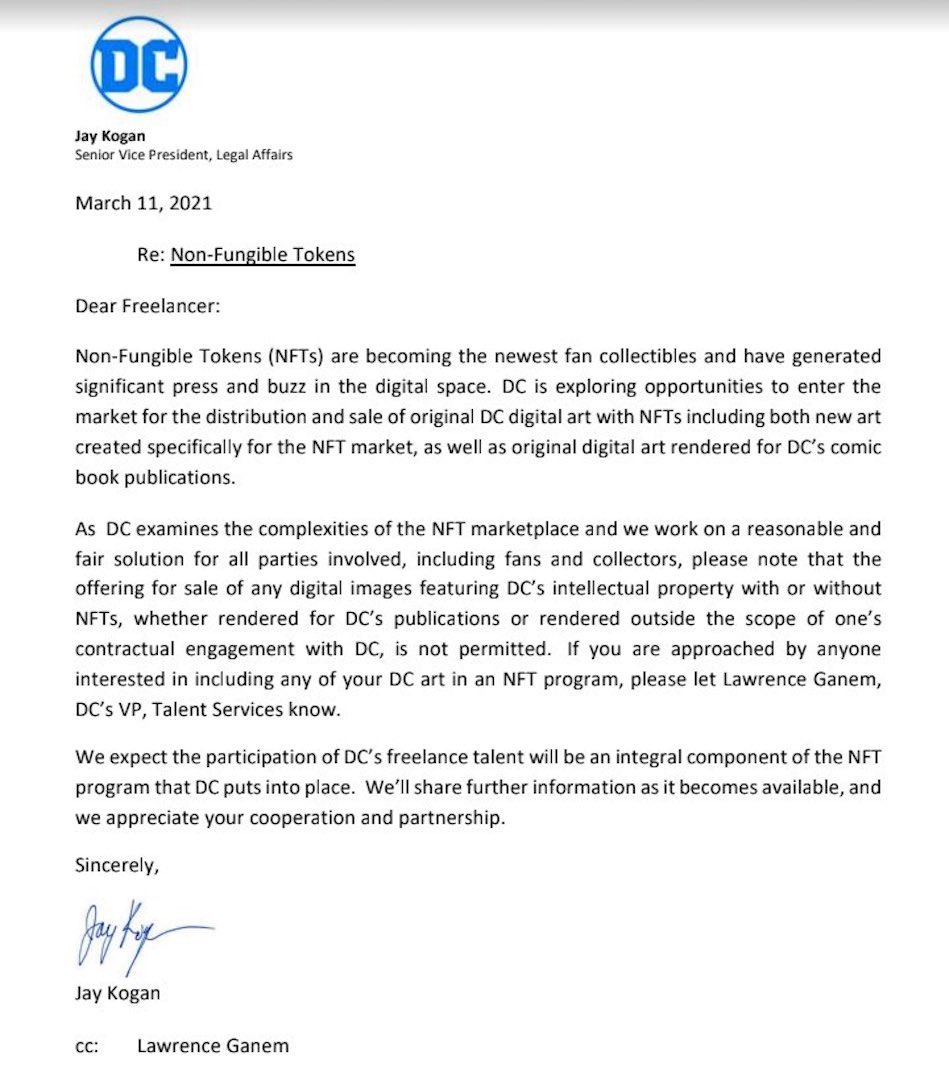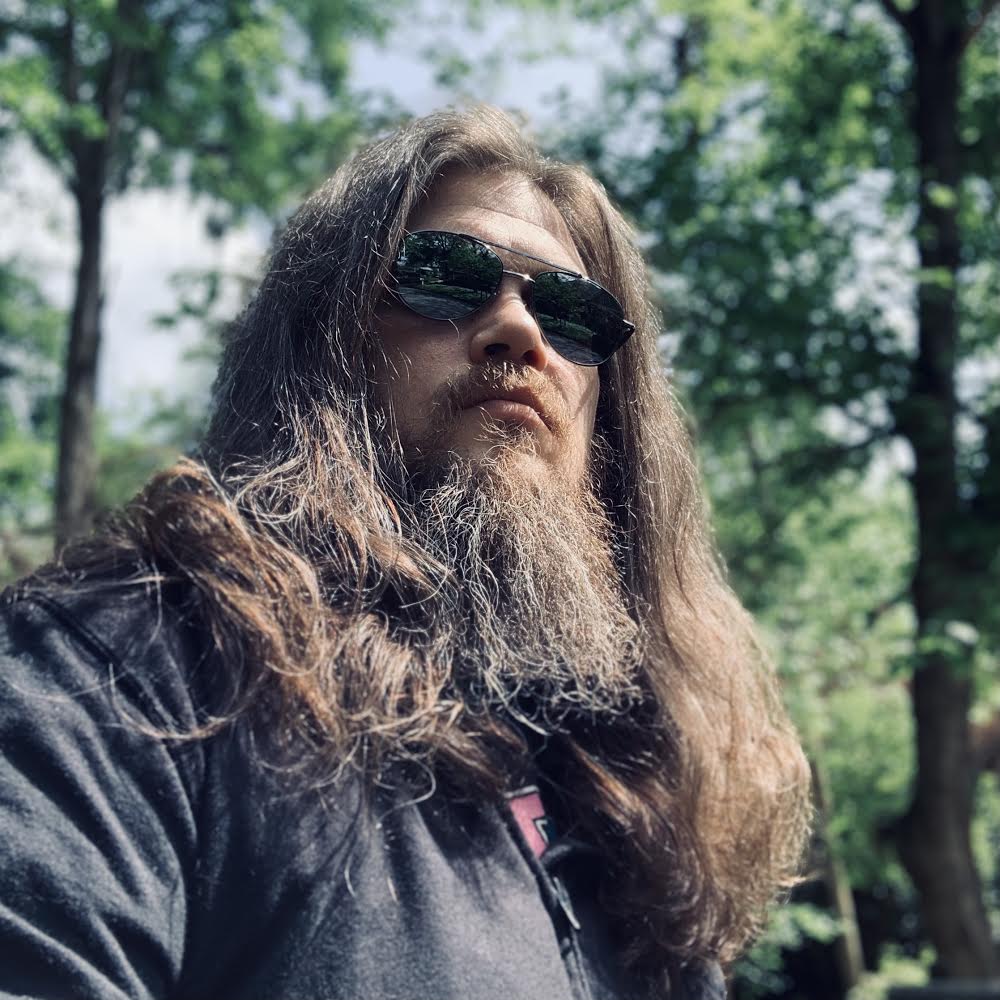DC anti-NFT legal notice gets turned into an NFT
DC has apparently barred its freelance artists from creating digital works based on their characters

Update: Proving the universe has a sense of humor (if not of ecological preservation), DC's legal notice to freelance artists that they are not allowed to sell digital artworks featuring DC characters or to mint NFTs (Non-Fungible Tokens) of their DC art has been digitized and minted as an NFT.
As reported by BoingBoing, artist Sean Bonner (who mints NFTs of his own artwork) has created an NFT of DC's letter.
NFT blockchain verification is not regulated in most cases, meaning that just about anyone can claim an image or digital media and mint an NFT based on it.
Because copyright law varies in different geographical jurisdictions, and because NFTs are considered 'intangible' versus 'tangible' goods, artists whose work is minted as an NFT without their authorization may be able to pursue copyright notice regarding stolen work - though in many cases pursuing copyright claims against an NFT maker can amount to significant legal costs.
In the case of a letter on the other hand, it's unlikely DC has any copyright claim to pursue - sealing the deal on the artistic statement of minting a photograph of their notice preventing individual artists of minting work involving DC's intellectual property as an NFT.
Original story follows
Newsarama has confirmed the authenticity of a letter that has been sent from DC/Warner Bros. to DC freelance artists, notifying them that they are not legally allowed to turn art they create for DC or of DC characters into NFT (Non-Fungible Token) cryptocurrency. Furthermore, it appears to bar DC freelancers from selling any digital art of DC characters whatsoever, even without an NFT component.
Comic deals, prizes and latest news
Get the best comic news, insights, opinions, analysis and more!

The letter, which was shared on Twitter by artist Remy Leonard, states that DC is "exploring opportunities to enter the market" of NFTs, alluding to not only the publisher's already controversial line of NFT digital Batman Black and White statues, but to potential other NFT collectibles including digital comic books.
"Dear Freelancer, Non-Fungible Tokens (NFTS) are becoming the newest fan collectibles and have generated significant buzz in the digital space," reads the letter. "DC is exploring opportunities to enter the market for the distribution and sale of original DC art with NFTs including both new art created specifically for the NFT market, as well as original digital art rendered for DC's comic book publications."
"As DC examines the complexities of the NFT marketplace and we work on a reasonable and fair solution for all parties involved, including fans and collectors, please note that the offering for sale of any digital images featuring DC's intellectual property with or without NFTs, whether rendered for DC's publications or rendered outside the scope of one's contractual engagement with DC, is not permitted," the letter continues. "If you are approached by anyone interested in including any of your DC art in an NFT program, please let Lawrence Ganem, DC's VP, talent resources, know."
The clause "with or without NFTs" seems to ban digital commissions or sales of other digital art for DC freelancers. Most freelance art contracts for DC and Marvel Comics allow the artists to sell physical copies of the art they render, and to create derivative works such as commissions for individual sale. However, they also usually bar freelancers from licensing their DC derivative work for reproduction, a necessary component of NFT crypto art.
"We expect the participation of DC's freelance talent to be an integral component of the NFT program that DC puts into place," the letter concludes. "We'll share further information as it becomes available, and we appreciate your cooperation and partnership."
The letter is signed by Jay Kogan, senior vice president of legal affairs for DC. Newsarama confirmed its authenticity with two freelance creators who received it from the publisher.
DC has already generated controversy with a line of digital-only Batman Black and White statues tied to NFTs, with the widow of Darwyn Cooke requesting DC remove her late husband's work from NFT licensed products.
NFTs are a kind of cryptocurrency that consists of blockchain-encrypted authentication designating a specific digital image as an 'original' despite how many copies may exist, owned by the holder of the NFT. NFTs have drawn recent scrutiny due to the environmental costs of creating them, which consumes a vast amount of electricity.
In DC's case, DC parent company Warner Bros. have partnered with Singapore based app VeVe, a subsidiary of tech company Ecomi. Newsarama has verified that Ecomi uses a type of blockchain known as Proof of Reputation, through a provider named GoChain. GoChain is listed as VeVe/Ecomi's partner on their website, while GoChain lists Warner Bros. themselves as a client.
Proof of Reputation is one of several ways cryptocurrency blockchains (a verifiable digital record of the provenance of a work or crypto token) verify their data. Most cryptocurrency is mined through a process called Proof of Work, which involves randomly distributing the computing power necessary to validate crypto transactions across multiple computers, a process that requires significant electricity consumption. Some blockchain providers use an alternate form of verification known as Proof of Stake, which randomly assigns the processing tasks to a single computer, which uses less energy but can take longer.
Proof of Reputation (PoR) works differently than both Proof of Work and Proof of Stake. In the case of Proof of Reputation, crypto transactions are not 'mined' by computer networks which distribute the processing power necessary for blockchain algorithms across multiple systems. Instead, Proof of Reputation is secured the old fashioned way - by large, well-known corporations promising the authenticity of their NFT products and securing the information in GoChain's database, which adds to an NFT's blockchain not by decrypting bits of code, but by inserting the information directly from the provider.
This essentially creates a digital chain of ownership and certificate of authenticity backed by the reputation of the company or creator who owns the art the NFT is based on.
"By using trusted nodes, transactions can be verified very quickly and the volume of transactions the network can handle increases by orders of magnitude," reads GoChain's description of its services. "Similar to systems we use every day that can handle high volumes, like a Google search or Visa payments, those systems can handle high load only because they trust the servers and the network they are running on."
This means that PoR authentication, while still environmentally intensive, does not incur the same rates of energy consumption as other forms of blockchain authentication - though the exact comparison between each type of blockchain's energy consumption is fairly complex.
Trying to reduce your environmental footprint? Consider switching to one of these, the best digital comic readers available.
I've been Newsarama's resident Marvel Comics expert and general comic book historian since 2011. I've also been the on-site reporter at most major comic conventions such as Comic-Con International: San Diego, New York Comic Con, and C2E2. Outside of comic journalism, I am the artist of many weird pictures, and the guitarist of many heavy riffs. (They/Them)



